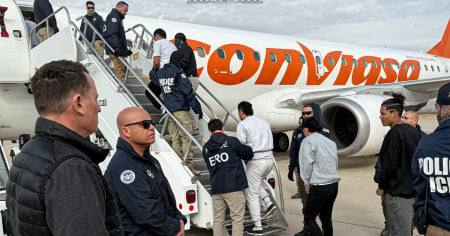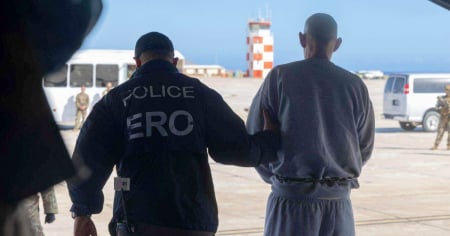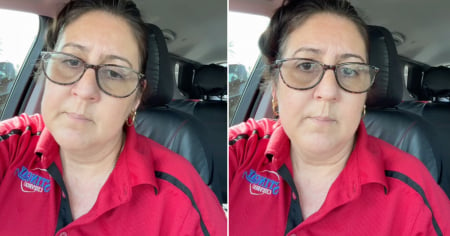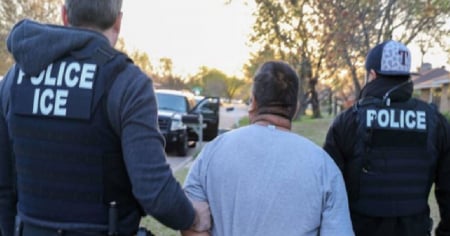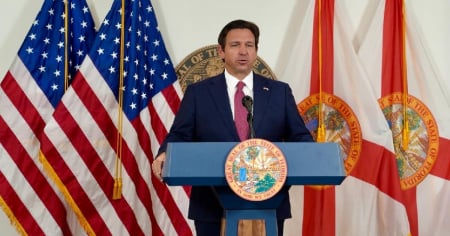This Monday, the first 190 migrants deported from the United States arrived in Venezuela on two flights operated by the state airline Conviasa.
Repatriation is part of the agreement reached between Nicolás Maduro's regime and Donald Trump's administration, following Richard Grenell's visit to Caracas, the former U.S. president's special envoy.
The planes landed at Simón Bolívar International Airport in Maiquetía past 9 PM (local time), where they were received by the Minister of Interior and Justice, Diosdado Cabello.
“Here come the first Venezuelans returning to their homeland; they will be welcomed as Venezuelans who, under certain circumstances, had to leave the country but are now coming back,” declared the official during an official broadcast.
"Justice is served when a migrant returns home in peace and tranquility," Cabello said at another moment.
"That story that everyone has a criminal record is a lie", emphasized the Minister of Interior and Justice in a conversation with journalists at the airport, and added that "it is being reviewed" how many of those who arrived have a criminal record.
The group of deportees spent the night in a shelter near the airport, located in the state of La Guaira, where authorities proceeded to register them and provide primary healthcare.
The Red Cross of Venezuela confirmed that a team of 40 volunteers, doctors, and rescuers assisted the migrants, providing them with “personal hygiene kits and snacks, as well as medications when necessary.”
Recently, the U.S. government announced that it would soon resume deportation flights to Venezuela, as confirmed last Friday by Tom Homan, known as the "Border Czar."
Despite Trump's refusal to recognize the legitimacy of Nicolás Maduro, who took office for a new term on January 10 amidst allegations of electoral fraud by the opposition — which asserts the victory of Edmundo González Urrutia — Trump sent diplomat Richard Grenell to Caracas.
Grenell met with Nicolás Maduro in an attempt to bridge the gap between the two countries, whose diplomatic relations have been suspended since 2019.
An unexpected agreement between Trump and Maduro
Subsequently, the White House announced that it had achieved the release of six American citizens detained in Venezuela and, in return, secured Maduro's commitment to accept deported migrants.
In a symbolic gesture, both shook hands while the president of the Venezuelan parliament, Jorge Rodríguez, smiled in the background. Maduro's government issued a statement reaffirming its intention to maintain a "dialogue between equals" with the U.S.
Days later, Maduro proposed a loan program of 10 million dollars to support Venezuelan migrants returning to the country.
This move suggests that Caracas may be preparing for the arrival of deportees, although it has not yet officially confirmed that it will accept all repatriates.
At the moment, some Venezuelans, deemed dangerous criminals, are already at the Guantanamo Naval Base, having arrived on two flights conducted on Tuesday and Thursday of this week.
In total, there are 23 illegal immigrants in Guantánamo, although it is not clear that all of them are Venezuelan.
Of the first group of 10, it was reported that they were members of the Tren de Aragua gang; in the second case, the Secretary of Homeland Security, Kristi Noem, specifically stated that the 13 were Venezuelans.
Hundreds of thousands of Venezuelans reside in the United States, many of whom are under temporary relief measures that have been revoked by the administration of Donald Trump, including the Temporary Protected Status (TPS) of 2023.
This decision leaves them vulnerable to the ambitious deportation plan of the Republican president.
Trump's strategy shift regarding Venezuela
During his first term, Trump unsuccessfully attempted to overthrow Maduro by imposing economic sanctions, supporting opposition leader Juan Guaidó, and offering a $15 million reward for the capture of the Venezuelan president on charges of narco-terrorism.
However, with the growing wave of Venezuelan migrants in the U.S. and the electoral promise to curb illegal immigration, the dynamics have shifted.
Now, Trump needs Maduro to accept the repatriation of Venezuelan migrants, a factor that gives greater influence to the Caracas government, The New York Times points out.
Furthermore, Venezuela is holding at least five Americans and two permanent residents in the U.S., according to the human rights group Foro Penal. This strengthens Maduro's negotiating power, as he could use these hostages as leverage in future discussions.
Filed under:

